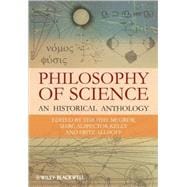
What is included with this book?
Marc Alspector-Kelly is Associate Professor of Philosophy at Western Michigan University.
Fritz Allhoff is Assistant Professor of Philosophy, Adjunct Assistant Professor at the Mallinson Institute for Science Education, and Director of the History and Philosophy of Science Workgroup at Western Michigan University.
| List of Figures | |
| Notes on Editors | |
| Personal Acknowledgments | |
| Text Acknowledgments | |
| Introduction | |
| Unit 1 The Ancient and Medieval Periods | |
| Atoms and Empty Space | |
| Letter to Herodotus: Epicurus | |
| The Paradoxes of Motion: Zeno | |
| PlatoÆs Cosmology: Plato | |
| The Structure and Motion of the Heavenly Spheres: Aristotle | |
| Change, Natures, and Causes: Aristotle | |
| Scientific Inference and the Knowledge of Essential Natures: Aristotle | |
| The Cosmos and the Shape and Size of the Earth: Aristotle | |
| The Divisions of Nature and the Divisions of Knowledge: Aristotle | |
| On Methods of Inference: Philodemus | |
| The Explanatory Power of Atomism: Lucretius | |
| The Earth: Its Size, Shape, and Immobility | |
| The Weaknesses of Hypotheses: Proclus | |
| Projectile Motion | |
| Free Fall | |
| Against the Reality of Epicycles and Eccentrics | |
| Impetus and its Applications | |
| The Possibility of a Rotating Earth | |
| Unit 2 The Scientific Revolution | |
| The Nature and Grounds of the Copernican System | |
| The Unsigned Letter | |
| The Motion of the Earth | |
| The New Star | |
| A Man Ahead of His Time | |
| On Arguments about a Moving Earth | |
| Eight Minutes of Arc | |
| Tradition and Experience | |
| A Moving Earth Is More Probable Than the Alternative | |
| The Ship and the Tower | |
| The Copernican View Vindicated | |
| The "Corpuscular" Philosophy | |
| Successful Hypotheses and High Probability | |
| Inductive Methodology | |
| Space, Time, and the Elements of Physics | |
| Four Rules of Reasoning | |
| General Scholium | |
| The System of the World | |
| Unit 3 The Modern Period | |
| The Inductive Method | |
| Rules for the Discovery of Scientific Truth | |
| Rationalism and Scientific Method | |
| Human Knowledge: Its Scope and Limits | |
| The Principle of Least Action | |
| Space, Time, and Symmetry | |
| The Problem of Induction | |
| The Nature of Cause and Effect | |
| The Metaphysical Foundations of Natural Science | |
| Unit 4 Nineteenth and Early Twentieth Century | |
| The Nature of Scientific Explanation | |
| Determinism, Ignorance, and Probability | |
| Hypotheses, Data, and Crucial Experiments | |
| An Empiricist Account of Scientific Discovery | |
| Against Pure Empiricism | |
| The Causes Behind the Phenomena | |
| Catastrophist Geology | |
| Uniformitarian Geology | |
| The Explanatory Scope of the Evolutionary Hypothesis | |
| Induction as a Self-Correcting Process | |
| The Nature of Abduction | |
| The Role of Hypotheses in Physical Theory | |
| Against Crucial Experiments | |
| On the Method of Theoretical Physics | |
| Introduction | |
| Unit 5 Positivism and the Received View | |
| Theory and Observation | |
| Scientific Explanation | |
| Empiricism, Semantics, and Ontology | |
| The Pragmatic Vindication of Induction | |
| Dissolving the Problem of Induction | |
| Unit 6 After the Received View | |
| Empiricist Criteria of Cognitive Significance | |
| The Raven Paradox | |
| Two Dogmas of Empiricism | |
| The New Riddle of Induction | |
| What Theories Are Not | |
| On Observation | |
| The Ontological Status of Theoretical Entities | |
| Unit 7 After the Received View | |
| Science: Conjectures and Refutations | |
| The Structure of Scientific Revolutions | |
| Science and Pseudoscience | |
| Unit 8 After the Received View: Explanation | |
| Counterexamples to the D-N and I-S Models of Explanation | |
| The Statistical Relevance Model of Explanation | |
| Why Ask, "Why"? | |
| Explanatory Unification | |
| Unit 9 After the Received View: The Realism Debate | |
| The Current Status of Scientific Realism | |
| A Confutation of Convergent Realism | |
| Constructive Empiricism | |
| The Natural Ontological Attitude | |
| Table of Contents provided by Publisher. All Rights Reserved. |
The New copy of this book will include any supplemental materials advertised. Please check the title of the book to determine if it should include any access cards, study guides, lab manuals, CDs, etc.
The Used, Rental and eBook copies of this book are not guaranteed to include any supplemental materials. Typically, only the book itself is included. This is true even if the title states it includes any access cards, study guides, lab manuals, CDs, etc.